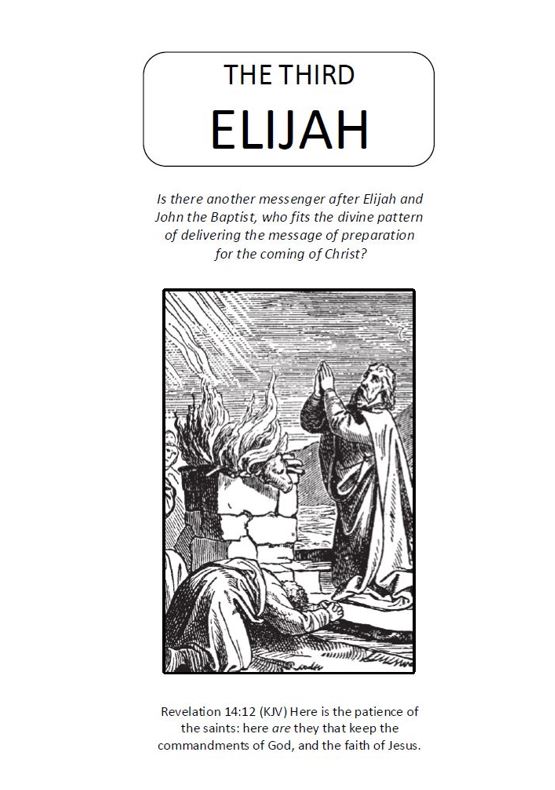What is a Fountarian
What is a Fountarian?
I originally coined the term Fountarian in Feb 2010 to represent my understanding from Scripture that the Father is the great source of all and His blessing flows out through His Son to the universe by His Holy Spirit. The term comes from the word fountain and is based on Ps 36:9; Prov 13:14 and Desire of Ages 21.
Psa 36:9 For with thee is the fountain of life: in thy light shall we see light.
Pro 13:14 The law of the wise is a fountain of life, to depart from the snares of death.
All things Christ received from God, but He took to give. So in the heavenly courts, in His ministry for all created beings: through the beloved Son, the Father's life flows out to all; through the Son it returns, in praise and joyous service, a tide of love, to the great Source of all. DA 21
And a word from our pioneers
“God ‘only hath immortality.’ He is the one fountain from which all life is derived. But he has given this prerogative to his Son, that he may give life to them that believe…John v.26”
R.F. Cottrell Review & Herald Mar 15, 1864
I wanted to develop a term that would describe my faith in a positive way as opposed to the term Anti-Trinitarian which many people use to describe what someone is against. I also wanted something that would have some meaning in its title as opposed to non-trinitarian which includes many faith groups including athiests. Below are the defining elements of the term fountarian for those who wish to know. This is simply an exercise in determing for myself what labels I wear rather than let others define them for me. As with all terms, others will probably come along and seek to redefine the term and place it in a different context from what it was intended but this is the original definition of the term and its purpose.
This page can also be accessed via http://fountarian.org
1. God the Father is the source of all life and blessing. It is His life that flows to us, making our hearts beat, provides our sustenance and inspires our thoughts. His blessing is the sense of acceptance and His satisfaction with us. The blessing is most powerfully demonstrated at the baptism of Jesus. Ps 36:9; Jer 2:13; Rev 22:1,2; Acts 17:28 Matt 3:17
2. Jesus is the Divine Son of God who proceeded forth from the Father and is the divine recipient of the Father’s blessing. In the heart of Christ is the full sense of the Father’s pleasure and acceptance. As Jesus has inherited all things, His heart is also fully submitted to the Father in love, trust and obedience. Micah 5:2; Prov 8:22-24; John 5:26; 8:42; Ps 40:8; Heb 1:2-4; John 5:19,30
3. The headship/submission relationship of the Father and Son forms a Divine pattern structure that allows the blessing of the Father to flow out through His Son into the universe and returns in love and praise to the Great Source of all. The identities of Father and Son must be correctly understood for this authority blessing structure to flow correctly. 1 Cor 8:6; 1 Cor 11:3; Desire of Ages Page 21.
4. The Father/Son relationship defines for us our understanding of authority, equality and value. Christ is the key to each of these definitions. His submission to the Father establishes the Father’s absolute authority. Therefore the Government rests upon His shoulders. The elevation of the Son based on the Father’s command and inheritance granted, places the value system that underpins equality firmly in the relationship and not in their power. John 10:29,30; Isa 9:6; Prov 17:6; Jer 9:23,24
5. It is the mind of Christ containing the sense of the Father’s pleasure and acceptance combined with His loving submission, trust and obedience that flows to the universe via the Spirit of God into the minds and hearts of all God’s intelligent creation. Our sense of value, acceptance come through this channel. Our sense of how to submit, love and trust also come to us through this channel. It is the spirit of Christ that cries in our hearts Abba Father. It is the Spirit of Christ in us that yields implicit obedience to the Father. In Christ we live and move and have our being. 1 Cor 2:16; Gal 4:6,7; Rom 8:9,10; John 14:16-18; John 15:26.
6. This headship/submission authority structure was reproduced in the creation of Adam and Eve. Their creation was a unique expression of the Father/Son relationship that was to yield answers as to how the Father/Son blessing structure functioned. Gen 1:26; Rom 1:19,20; 1 Cor 11:10
7. The protection of this channel of blessing occurred through the law as expressed in the 10 Commandments. This law protected the identities of God and man to keep these blessings flowing. Ps 1:1-3; Ps 111:7,8; Rom 7:12; Ps 119:97
8. It is the lie of the serpent in Eden that “You shall not surely die” that strikes at the very heart of God’s blessing authority structure. The acceptance of this lie changed in the mind of man his sense of his own identity and the identity of God. It broke the channel of blessing because the sense of independence that the lie creates, destroys the true identity of Christ in the mind of man and the dual authority relational system was consolidated into singular power system. Gen 3:1-5; Gen 3:9; Isa 59:2; Gen 4:12; Gen 6:4
9. Satan perfected his power based system through the perverted family relation of Nimrod, Semiramis and Tammuz. The identities of three individuals became confused and mystified through spiritualism and the belief in the immortality of the soul. This kingdom is symbolized through the first city built by Nimrod called Babylon. This system of worship is directly opposed to the family blessing structure of the Father and Son and the family image of husband and wife and seeks to destroy them by destroying the headship/Submission family system. Gen 10:8-10; Gen 11:4; Jer 50:33,34; Isa 1-3; Rom 1:16-32.
10. God called Abraham out of Babylon and re-established His channel of blessing headship/submission authority structure through him. It is through the covenant with Abraham that all the families of the earth would be blessed. The security of this covenant rests upon the correct family structure to ensure the sense of the Heavenly Father’s pleasure and acceptance and the Son’s loving trust and obedience can flow down through these human family channel. The process of Abraham coming out of Babylon is the pattern for the church coming out of spiritual Babylon. Gen 12:1-3; Gen 18:18,19; Gen 49:28; Ex 4:15; Ex 17:8-13. Rom 4
11. The Church is an extension of the family unit and operates under the same dual authority. The responsibility of the elders is to care for the fatherless and the widows and provide a wall of protection to the family of God. The role of eldership resides in the male and his authority rests upon the trusting submission of the church. At the higher level, the elder is subject to the Word of God which is the word of the prophets who speak on behalf of God. If an elder rebels against the Word, the church appeals and intreats the leader as to a father. The members do not rebuke or undermine the elder or leader but esteem them highly in love and pray that God will continue to pour his blessing through them. 1 Tim 3:1-5; James 1:27; 2 Tim 3:16; 1 Tim 5:1,2; I Thess 5:12,13
12. As Israel of old came up to the boarders of the promise land and rebelled against the Lord, so His covenant church today rejected the message that would allow them to go into the heavenly Canaan. This rejection caused a loss of the true knowledge of God and especially of the person of Christ as the Son of God. The covenant relationship keeps His people together praying for the leaders to reopen the channel of blessing that has been shut and confessing their sins after the order of the prayer of Daniel 9. God’s people do not leave the covenant family but remain together under the covenant that promises the blessing. In the last days God sends Elijah to turn the hearts of the fathers to the children and the children to the fathers through an awakened sense of Christ as the Son of God which reestablishes the dual authority blessing system. This prepares a way in the desert for the spirit of the Lord to enter the hearts of His people. This awakened knowledge through Elijah culminates in the message of Revelation 18 that lightens the earth with its glory. Then the latter rain of God’s blessing is poured out and God’s people receive the full measure of the Father’s pleasure and acceptance combined with the loving trusting obedience of Christ in the context of the Ten Commandments. God’s people triumph over Babylon and claim their inheritance in the heavenly city and find their complete rest before the throne of God and the lamb. Num 13 and 14; 1 Cor 10:11; Daniel 9:1-19; Mal 4:5,6; Mark 10:14-16; Isa 40:1-6; Rev 1:1-3; Rev 14:12; Rev 22:14; Rev 5:13,14





